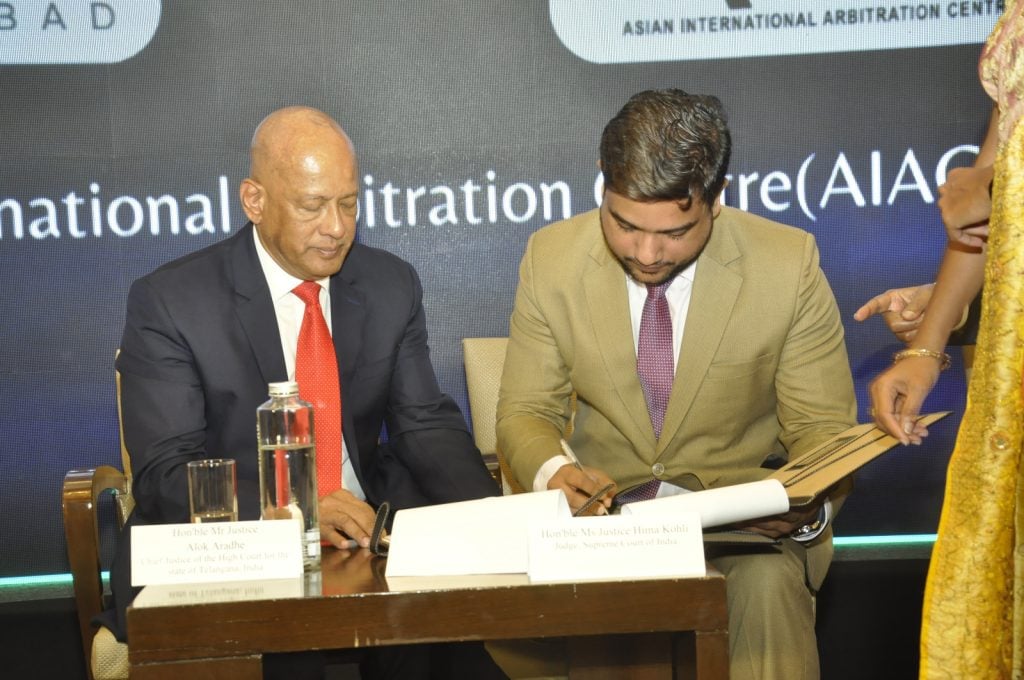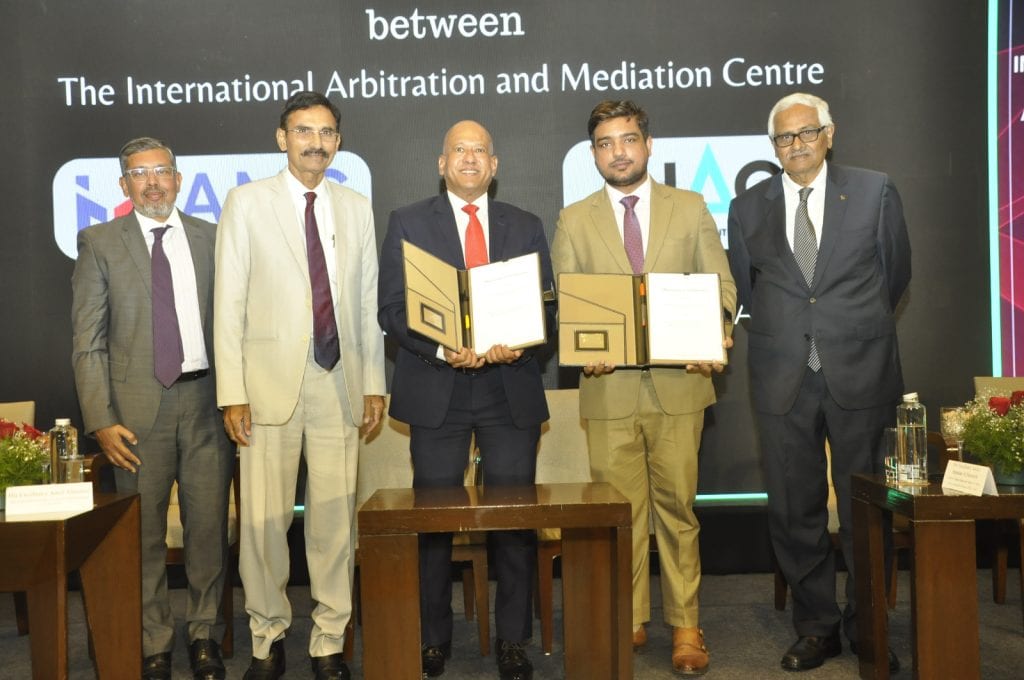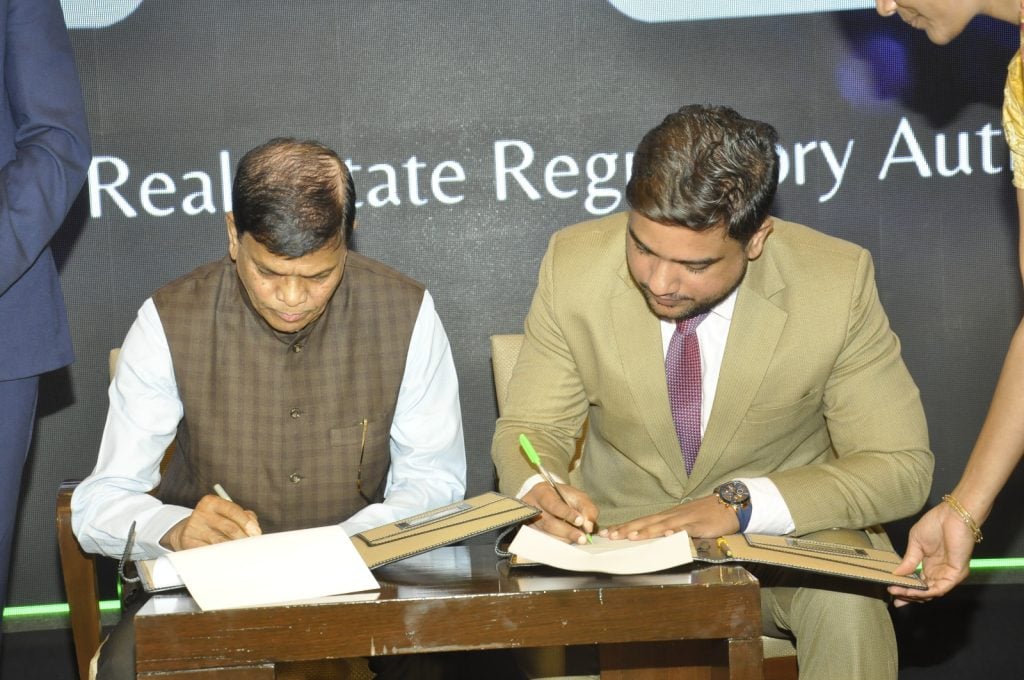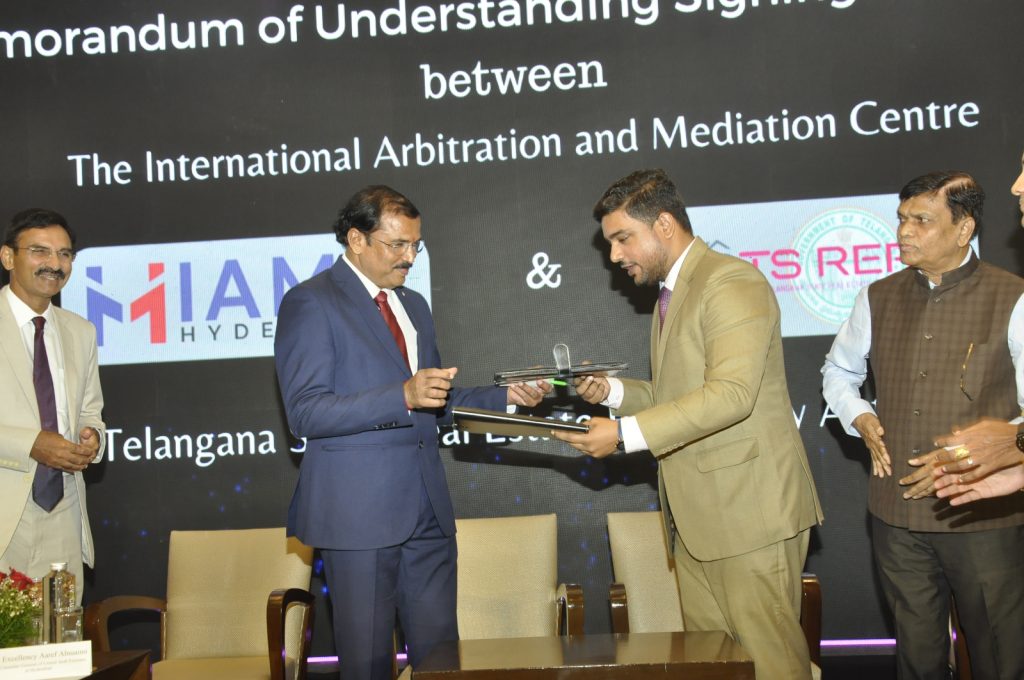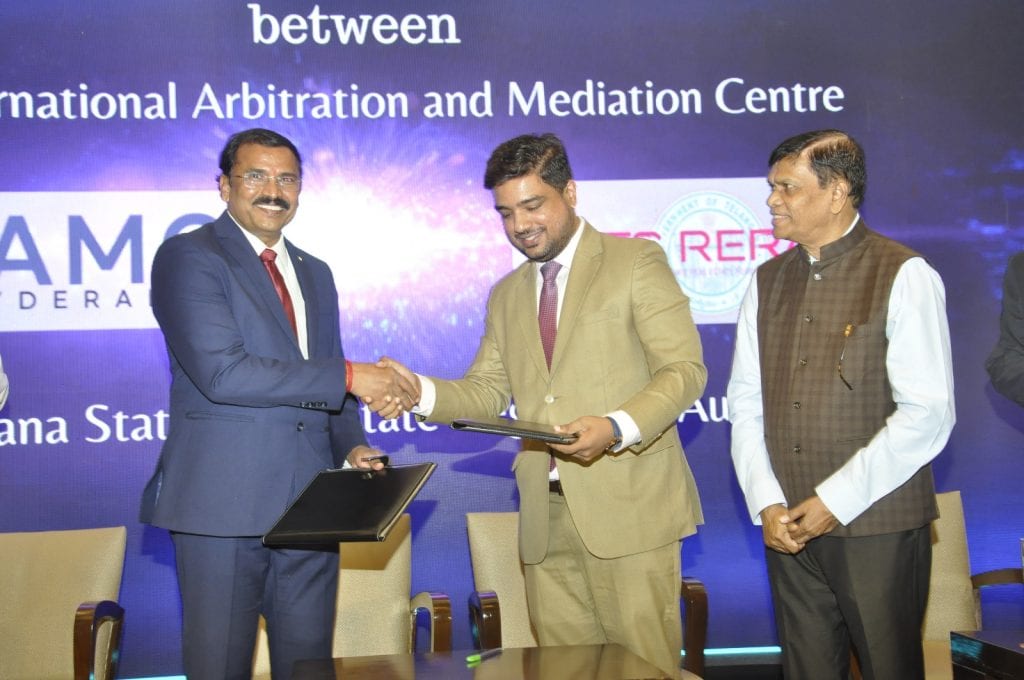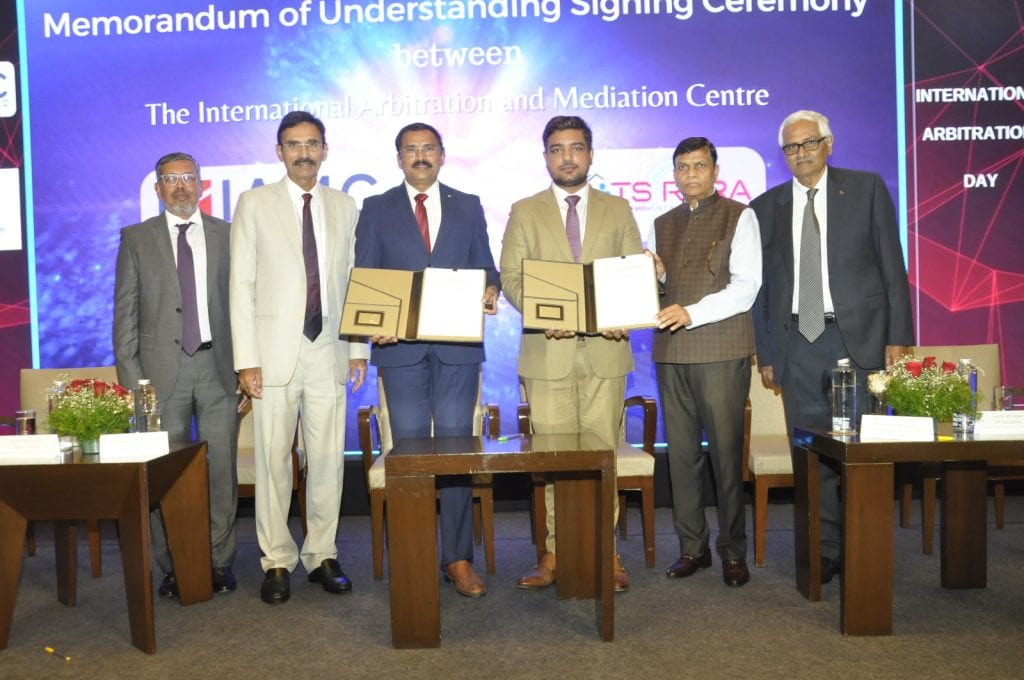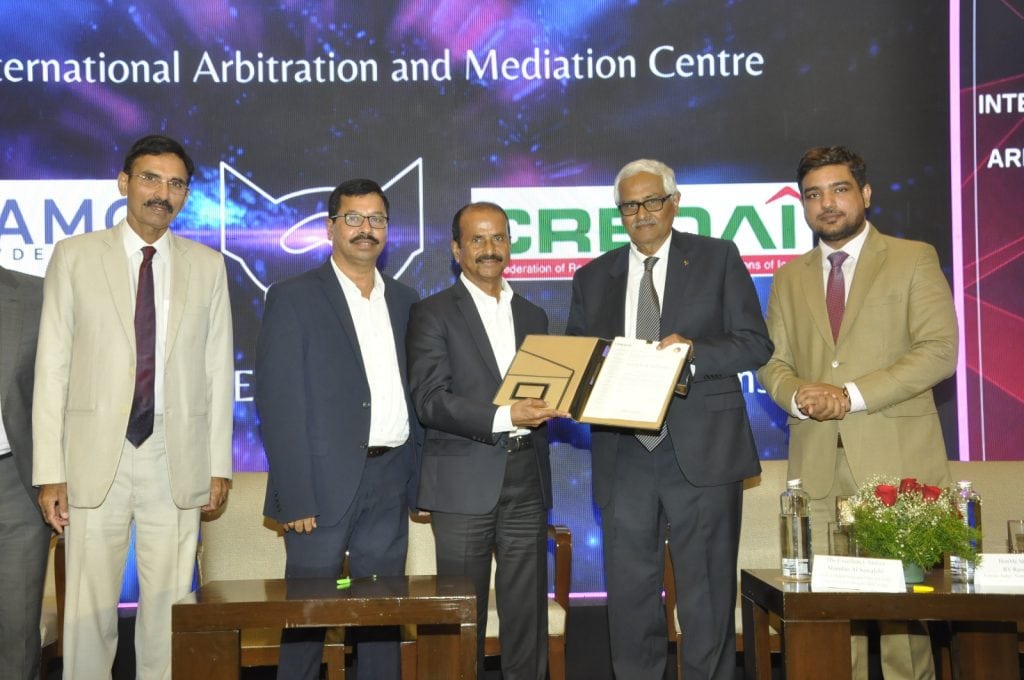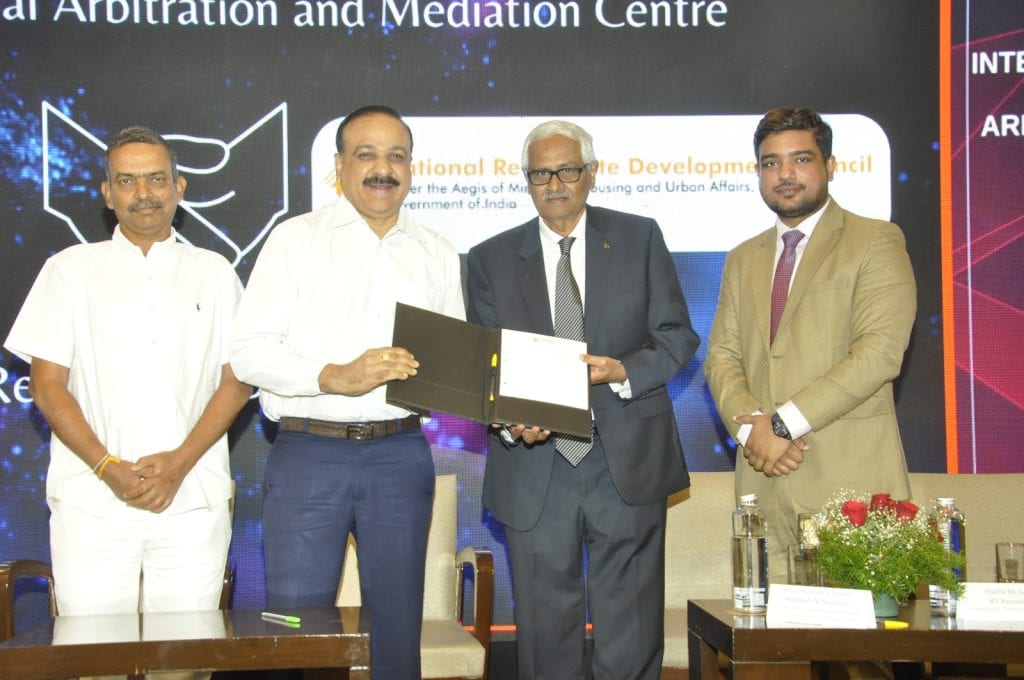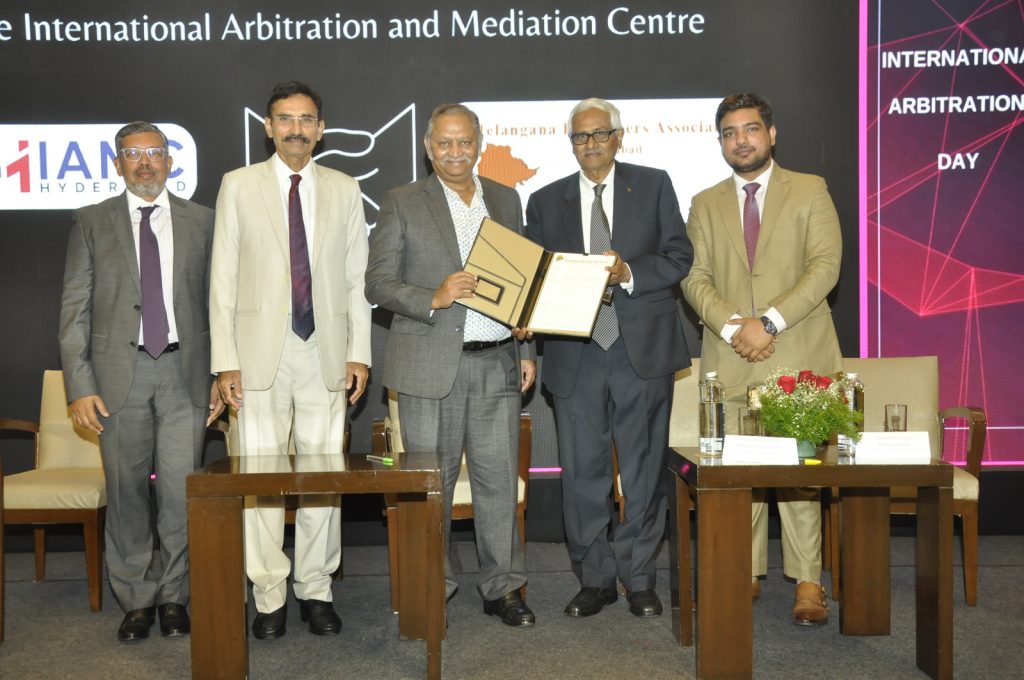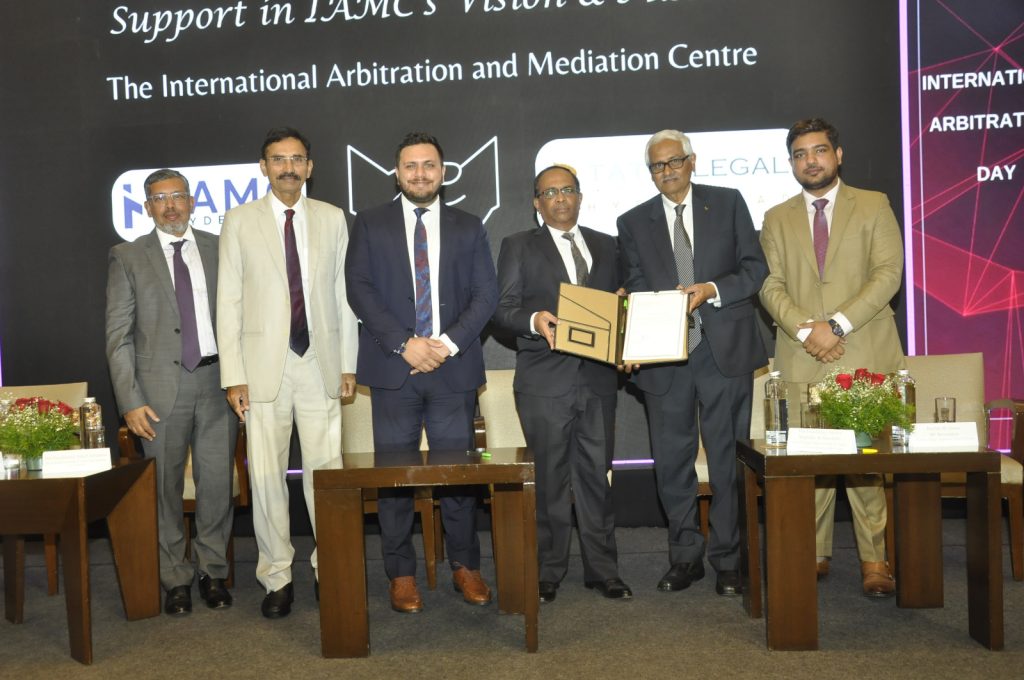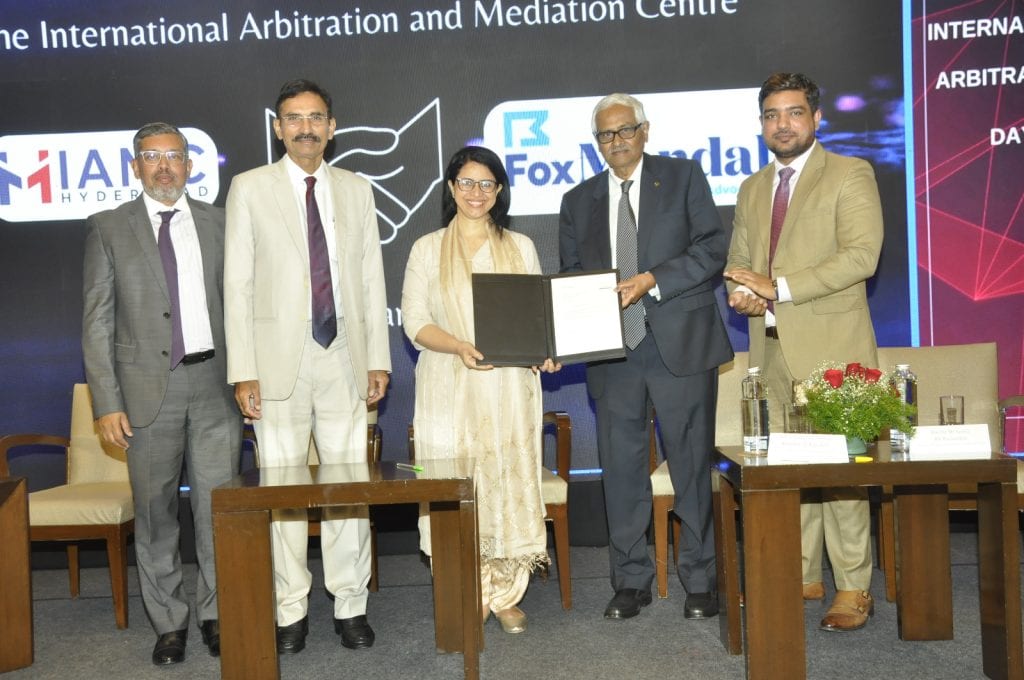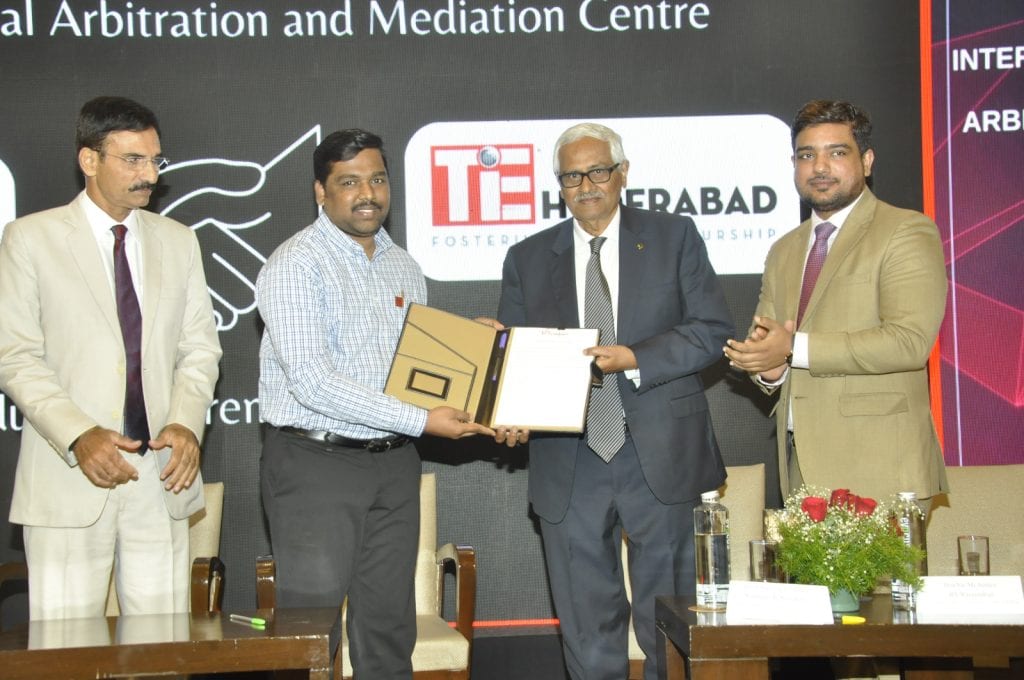Indian and International Organizations extend support to IAMC at the International Arbitration Day
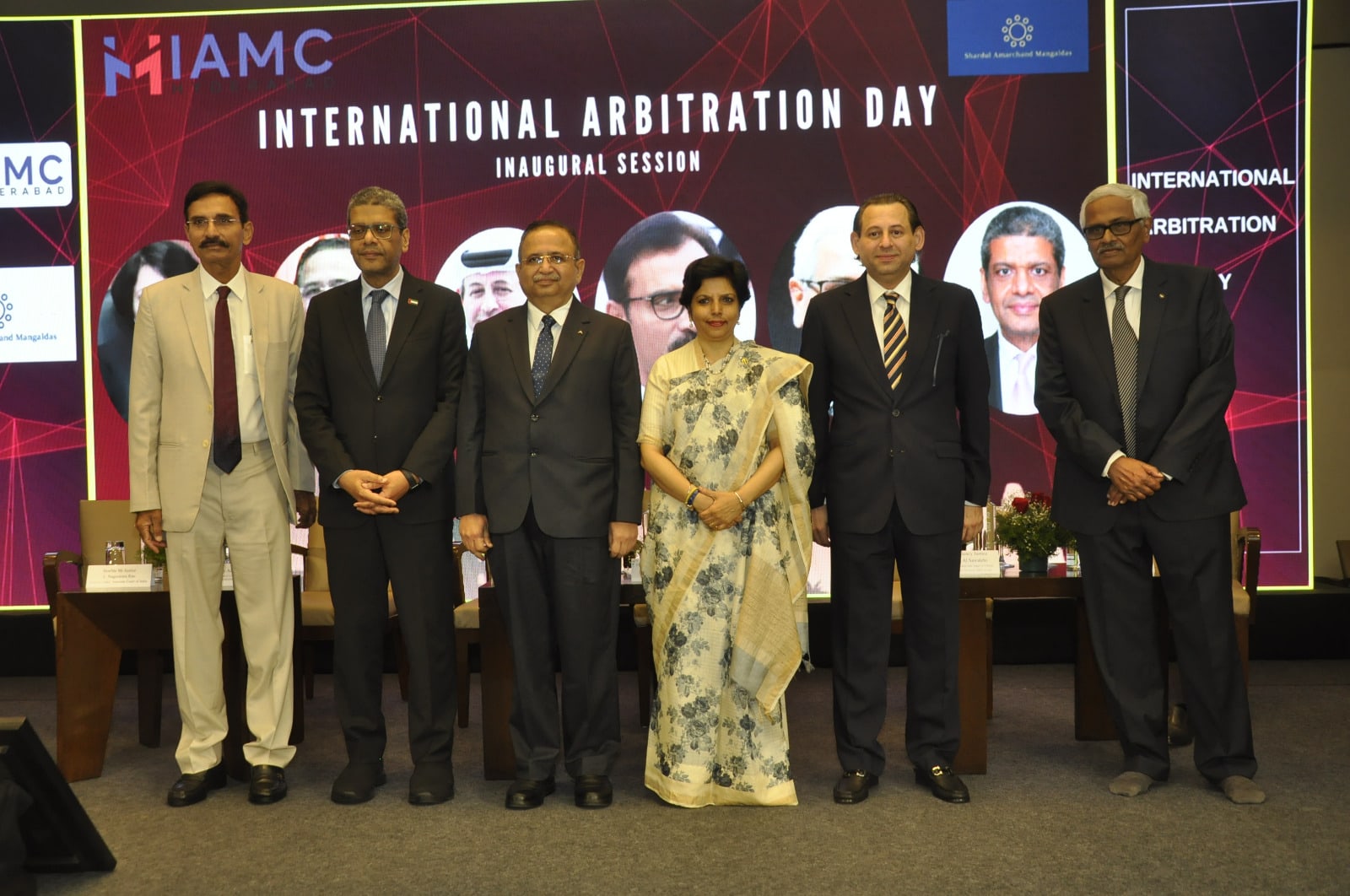
The International Arbitration & Mediation Centre (IAMC) Hyderabad in collaboration with Shardul Amarchand Mangaldas & Co. has organized its first flagship event – International Arbitration Day on October 07, 2023.
The event witnessed dignitaries from across the globe, including Supreme Court Judges and High Court Judges, Senior Advocates, International Judges, senior members International arbitral Institutions, Partner from foreign and Indian Law firm Partners, industry bodies like, CREDAI, RERA, TDA, TiE, NAREDCO, in-house counsels and other stakeholders.
The flagship event began with the inaugural session where Hon’ble Ms. Justice Hima Kohli, Judge, Supreme Court of India delivered the keynote address while Hon’ble Justice Alok Aradhe, Chief Justice, High Court for the State of Telangana delivered an address highlighting the need to foster the growth of arbitration in India.
The inaugural session was also graced by His Excellency Justice Shamlan Al Sawalehi, Court of Appeal and Judge in Charge of Arbitration Division, DIFC Courts, UAE, His Excellency Areef Alnuaimi, Consulate General of UAE at Hyderabad, and our life trustees Hon’ble Justice L. Nageswara Rao, Former Judge, Supreme Court of India, and Hon’ble Mr. Justice RV Raveendran, Former Judge, Supreme Court of India.
Hon’ble Ms. Justice Hima Kohli in her keynote address remarked, “This unique event has been meticulously organised by the International Arbitration & Mediation Centre, Hyderabad in collaboration with Shardul Amarchand Mangaldas and Company bringing together global experts in the field of arbitration from the Middle East and Asia. The event has been aligned with the firm belief of bolstering arbitration as an ADR, guaranteeing its prominence in paralleling and resonating distinctly within the international legal paradigm. The arena of international arbitration is dynamic by its very nature.”
“The flavour of arbitration in Asia has been augmented by the generally pro-arbitration stance taken by countries in the region. Arbitration hubs and institutions in Asia have reached new heights in their growth and popularity, achieving stellar global rankings and an ever-growing number of case filings.”
She further remarked that in recent years, India and UAE both have made significant strides in establishing themselves as reliable and trustworthy partners in arbitration services. The setting up of IAMC at Hyderabad is a prime example of the constructive step taken towards enhancing the Alternative Dispute Resolution (ADR) landscape in India.
“The growing prominence of institutional arbitration in India and even globally, points towards the necessity of a specialised Arbitration Bar, comprising of experts and legal practitioners dedicated to arbitration. A specialised Arbitration Bar, particularly in India, will promote a cultural shift in the legal community, positioning arbitration as a niche field of expertise. It will attract fresh talent and, at some stage, perhaps call for specialised Arbitral Tribunals at High Courts and District levels, akin to Commercial Benches. Regular workshops and training sessions will streamline every facet of the arbitration process, from drafting to enforcement. These measures will help boost both domestic and international confidence in India as an arbitration hub. This would also ensure that arbitration gains primacy and does not take a back seat as compared to litigation in courts. Such a dedicated Arbitration Bar will help in adhering to fixed timelines, quick disposals and not mirror court proceedings. One example of such a Bar is the International Bar Association Arbitration Committee (“the IBA Committee”) which focuses on laws, practice and procedures relating to arbitration of transnational disputes. Therefore, what is perhaps a must for strengthening the process of arbitration in India is promoting a strong and experienced cadre of arbitrators and a specialized Arbitration Bar.”
“It is imperative to recognise that the essence of justice lies not only in honouring arbitral awards but also in safeguarding the interest of fairness and equity. In this context, the Indian Judiciary’s unwavering support to the arbitration process must also be underscored. Judicial intervention on grounds of patent illegality or public policy is treated as an exception to the rule. Guided by the principles of party autonomy and minimal interference, the Indian judiciary exercises prudence and restraint in interfering with arbitral awards.
“Another significant issue that needs to be flagged is the lack of diversity, including gender diversity, amongst international arbitrators. Gender-based diversity in arbitrators is essential for promoting inclusivity and fairness in the field of dispute resolution. Justice Kohli further stated that with regards to under-representation of women in arbitral tribunals, “in the year 2015, members of the arbitration community drew up the “ERA” (Equal Representation in Arbitration) Pledge (the “Pledge”) to take action. The Pledge seeks to increase, on an equal opportunity basis, the number of women appointed as arbitrators in order to achieve a fair representation as soon as practically possible, with the ultimate goal of full parity. “In UAE, which has emerged as a world-class centre for international trade due to its liberal economic regulation and business friendly policies, the diversity in the boardrooms and an increasing number of women investors are contributing to a more diverse and inclusive startup opportunities.”
“There are several other ways to promote women in the field of arbitration. Arbitration institutions must develop systematic and collaborative strategies in key areas. These include enhancing education and training through scholarships for women and representatives of other under-represented groups and revising institutional arbitration rules to appoint diverse arbitrators, particularly women, a standard practice in the selection process. Additionally, increasing awareness activities like the present one must be undertaken on a regular basis to update all stakeholders in international and domestic arbitrations including parties, General counsel, litigation lawyers and arbitrators, to bring a balance in making the appointments.”
“For achieving an equitably diversified and globally attuned arbitration framework, it is imperative to promote the fusion of ancient wisdom, replete in the Middle East and Asian regions with contemporary advancements and a constant pursuit of impartiality, innovation and broad consensus. Collaboration is vital in our onward journey towards fostering an environment of mutual respect, multi-cultural sensitivity and unwavering commitment to upholding the sanctity of arbitration. This will contribute constructively to the global legal narrative. We must also remember to meld our rich historical practices with modern innovations and giving primacy to the principles of party autonomy, fairness and inclusivity.”
“As we stand at the crossroads of tradition and innovation, let us reaffirm our shared vision for a brighter and harmonious future of global arbitration. Let us cultivate an ecosystem of respect and commitment to the core tenets of arbitration.”
Justice Alok Aradhe in his address emphasized, “This day serves as a beacon of guide for resolution of complex cross-border disputes.” He further stated that core principles of neutrality, enforceability and efficiency must be maintained while ensuring that international arbitration remains an effective and trusted means of dispute resolution. Furthermore, it is important to recognize the need for continuous innovation to tackle challenges where the arbitral institutions can come in handy. In conclusion, he stated that today’s celebration serves that international arbitration is the cornerstone of global growth and diplomacy and it is pertinent to rely and utilise the power of dialogue in dispute resolution as it strengthens cooperation amongst nations and leads to peaceful resolutions.
The inaugural ceremony was followed by signing of MoUs and letters of support with leading organizations and law firms in Telangana where IAMC Hyderabad signed an MoU with the Asian International Arbitration Centre (AIAC) and Telangana State RERA and letters of support from organisations like CREDAI, NAREDCO, TDA, TiE, Tatva Legal and Fox Mandal & Associates.
Panel Discussion: What Arbitration Can Do to Foster A Culture of Investment Between India & UAE
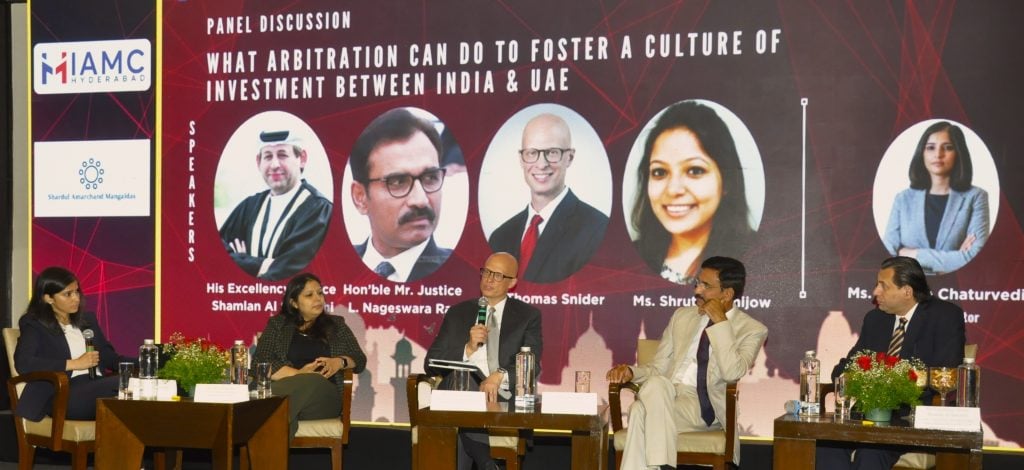
His Excellency Justice Shamlan Al Sawalehi remarked that majority of businesses in the middle east prefer arbitration due to party autonomy, neutrality and confidentially involved in the process rather than going to a local court. He further emphasized, “You need to pick up a neutral seat which is familiar with common law because you need the court to support you.” In UAE, there are various options of dispute resolution, either you go to local courts or go for ad-hoc or institutional arbitration. The 7 Emirates have their own arbitration centres as well as arbitration centres dedicated to specifically to Islamic finance. Recently, there have been developments in the arbitration law, federal arbitration law and DIAC arbitration law in UAE. In terms of facilities, legislation, and court’s support, UAE is arbitration friendly. It is important to see how supportive the country is towards arbitration when choosing the seat of arbitration. Regarding the enforcement of arbitral awards in India that are passed in the UAE, we have escalated the matter to the Ministry of Justice in UAE to deliberate with the Ministry of Justice in India to make the process of enforcing foreign arbitral awards easier in India that are passed in UAE seated arbitrations as taking the indirect route of enforcing UAE based arbitral awards as foreign decrees in UAE and then Indian courts involves additional costs and delay. One way of mitigating this issue of enforcement can also be if there are designated courts for dealing with arbitration matters. Now in UAE, there is minimal interference by courts in enforcement of arbitral awards.
Hon’ble Mr. Justice L. Nageswara Rao highlighted when an international contract is entered into, the dispute resolution clause, the seat of arbitration, the credibility of the panel of arbitrators from a credible institution, and the procedural law of the seat of arbitration are all very crucial factors that need to be considered. It is not necessary that only judges should be arbitrators, rather legal professionals, advocates can be also appointed as arbitrators. As far as IAMC is concerned, when the panel of arbitrators will be prepared, it will have a mix of arbitrators, and not only judges but legal professionals as well as other experts from various industries will be considered and the parties will have the autonomy to choose from the prepared panel. “Neutrality in arbitration is very important in Arbitration.” The first roadblock is when an award is passed in an arbitration seated in UAE is enforceability, there has been no notification issued u/s 44B of the Arbitration & Conciliation Act of 1996 by the Government of India. However, the only notification issued u/s Section 44 of Civil Procedure Code, 1908, refers to foreign decrees passed by federal courts and superior courts in UAE which can be enforced in India in terms of foreign awards. Another roadblock was public policy which has now been explained to include only fundamental public policies which can pose as grounds of rejection of enforcing foreign awards in India. Delay also appears to be a major problem. In near future, enforcement might not be a problem since the number of commercial courts will soon be increased.
Mr. Thomas Snider, Partner, and Head of International Arbitration Charles Russell Speechlys, remarked that the trade bond between India and UAE is very strong and there exists a strong investment relationship between India and UAE. In terms of Cross-Border Investment, there are various dispute resolution options available in it. Arbitration is attractive because of enforceability under the New York Convention and the ability to appoint the decision-maker and a neutral decision-maker is always preferred because parties may not be comfortable with being in courts of another country. In UAE, there are three options as to the seat of arbitration, on-shore federal arbitration law, which applies throughout the country; the DIFC which has its own set of commercial arbitration laws based on UNCITRAL Model and the common law system and the third one is in Abu Dhabi Global Market having own arbitration law. “If I were an Indian party thinking about having an arbitration seat outside India, I would look at DIFC or ADGM. You can also have IAMC as the venue of arbitration if the arbitration is seated in Dubai.”
Ms. Shruti Khanijow, Partner, Shardul Amarchand Mangaldas & Co. stated that it is important for investors to understand the judicial and commercial arbitration system in place in India and UAE. Parties prefer seats of arbitration where there are certainty, efficacy and lower costs in the arbitral process and the speed of granting interim measures is quicker.
Ms. Parnika Chaturvedi, Partner, Kings Wood & Malleson, Dubai, UAE, moderated the session.
Fireside Chat Session: Between Dispute Avoidance and Dispute Resolution: The Asian Approach
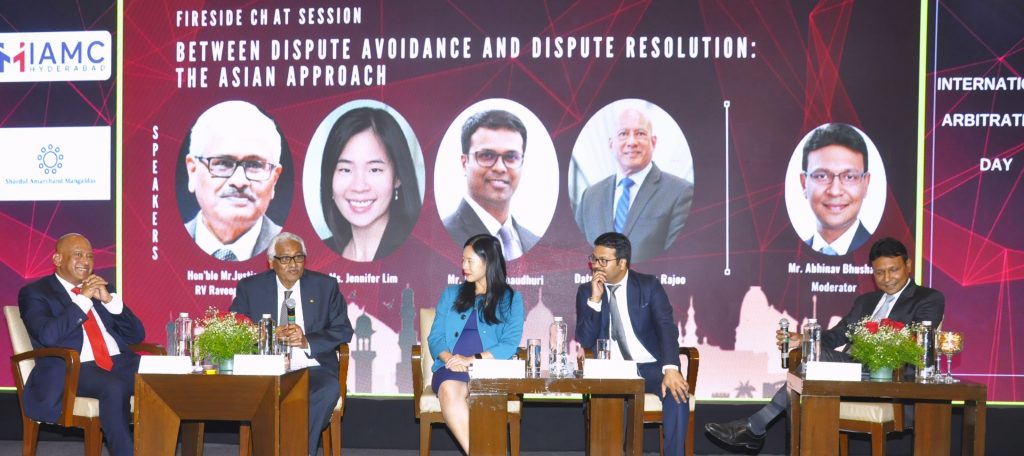
Hon’ble Mr. Justice RV Raveendran stated that care should be taken while drafting the agreement. Dispute avoidance is a preventative step while dispute resolution is a curative step. If dispute avoidance clauses are put in place, then a lot of disputes could be avoided. Today, lawyer, does not refer to litigation, rather in law firms or big industries, a lawyer comes into play since the beginning of businesses; They act as transaction lawyers or in-house counsels and these lawyers can help in preventing disputes and litigation. Indian mentality has merit, ability and capacity but lacks professionalism, added to all other abilities we have, India will be capable of resolving their own disputes and the professionalism will ensure that arbitrations are completed on time. Let us change the culture and bring in professionalism. “Integrity is not a quality; it is the fundamental requirement. Let us make this as the culture of IAMC. Government is not against mediation but the problem is not the government, the problem are the government servants because they are not willing to mediate. He suggested that the mindset of the government servants have to be changed and a system has to be introduced where a group of officers can sit as a panel and give reasons why that matter is getting settled. Government is the biggest economic litigant in India and mediation will have to come to its rescue.
Datuk Professor Sundra Rajoo, Director, Asian International Arbitration Centre, Malaysia commented that disputes arise because of differences in interpretation or in addressing the problems. The solution is crafting better contracts, anticipating difficulties, and performing particular aspects of obligations. The types of contracts are changing because business dynamics are also changing. There are compliance requirements like ESG that are to be followed today which must also be taken into account while contracts are drafted. Regarding dispute resolution, some of the techniques that parties/arbitration lawyers can adopt for resolving disputes is to look where the arbitration is seated and look at the governing law. Lex Arbitri is very important and it is not always the model law and once the governing law is understood, one must take a look at the institutional rules if it is an arbitral institution, and if the arbitration is ad-hoc one, then one must look at what rules industry has in place or follows. I believe the culture does have a role to play,
Ms. Jennifer Lim, International Arbitration and Dispute Resolution Lawyer, Partner at Sidley Austin LLP, Singapore remarked that if the negotiations at business level have not worked, arbitration or court proceedings need to be looked at in order to harden the positions. During the document verification stage, the risks are assessed and thereafter the arbitration goes into mediation where the parties are explained the risks of not settling, especially the risk of an award that may not favour the parties if the mediation fails and the case proceeds for an award in arbitration. It is because of the risk of not settling that the arb-med-arb works. In terms of saving time and costs, preserving relationships, the combination of arbitration and mediations works excellently. Involve lawyers as early as possible in any new venture and lawyers involved to understand what strategy to take when a dispute arises.
Mr. Bikram Chaudhuri, Partner, Shardul Amarchand Mangaldas & Co commented, “The focus should be on mediation and on training in mediation and IAMC is going in the right way with this.” If things go absolutely wrong in businesses, which usually and eventually happens, they should simply severe the ties in such a case but a strategy of mediation and arbitration seems to work better in such cases. Culture plays a big role in dispute resolution and my observation is that more often than not, Indian parties when first they engage in a dispute, they immediately run to courts and they have the mindset to get an interim order swiftly and once they have procured that interim order, they realize that they need to settle the matter and it creates an interesting mix of Lit-Med-Arb that takes places in India.
Mr. Abhinav Bhushan, Chief Executive for Asia & International Arbitrator, Member at 39 Essex Chambers, moderated the fireside chat session and commented that “IAMC has both Mediation and Arbitration Rules in place which complement each other at a world class level.”
Hon’ble Mr. Justice L. Nageswara Rao added further remarks to the fireside chat session and talked about deal mediation as an effective tool of dispute avoidance. It refers to involving mediators at the stage of entering into agreements who will tell the parties about possible problems and at what stage they could arise therefore industry leaders should consider engaging a deal mediator for avoiding disputes.
The flagship event of IAMC Hyderabad was concluded by a vote of thanks by Mr. Tariq Khan, Registrar, IAMC Hyderabad.
